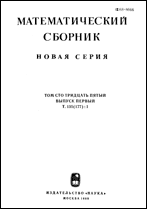|
This article is cited in 6 scientific papers (total in 7 papers)
On representing entire functions of several variables by Dirichlet series
A. F. Leont'ev
Abstract:
Let $F(z_1,z_2)$ be an entire function of two complex variables. Let us take the proximate order
$$
\rho(r)=1+\frac{\psi(\ln r)}{\ln r},\quad\psi(u)\uparrow\infty,\quad\underset{x\to\infty}{\psi'(x)}\downarrow0,\quad\frac{\psi(x)}x\to0,
$$
and then define positive numbers $\mu_k$ ($k\geqslant1$) so that $\mu_n^{s(\mu_n)}=n/\tau$, $0<\tau<\infty$. Let us choose an integer $m>2$ and form the numbers $\mu_ne^{2\pi ik/m}$ ($k=0,1,\dots,m-1$; $n=1,2,\dots$). Let $\lambda_k$ ($k\geqslant1$) be arranged these numbers in the order of decreasing modulus. For a proper choice of the function $\psi(x)$ and the number $\tau$, the representation
$$
F(z_1,z_2)=\sum_{n,m=1}^\infty a_{n,m}e^{\lambda_nz_1+\lambda_mz_2}
$$
holds in the whole space $\mathbf C^2$.
Bibliography: 6 titles.
Received: 29.03.1972
Citation:
A. F. Leont'ev, “On representing entire functions of several variables by Dirichlet series”, Math. USSR-Sb., 18:4 (1972), 589–602
Linking options:
https://www.mathnet.ru/eng/sm3249https://doi.org/10.1070/SM1972v018n04ABEH001862 https://www.mathnet.ru/eng/sm/v131/i4/p586
|


|




 Contact us:
Contact us: Terms of Use
Terms of Use
 Registration to the website
Registration to the website Logotypes
Logotypes








 Citation in format
Citation in format 
